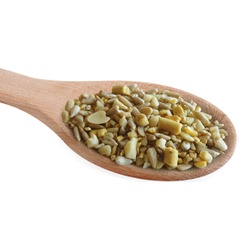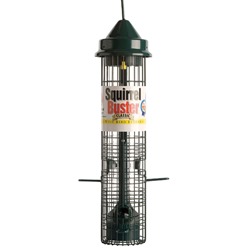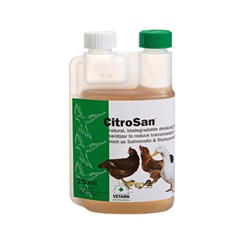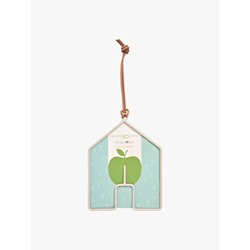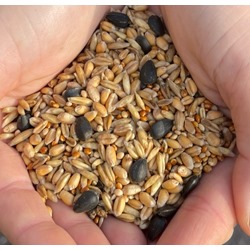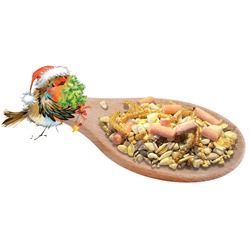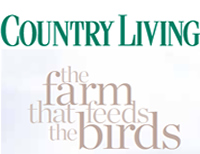
It’s an average September morning in the Smith farmhouse kitchen in Hampshire: Richard has drained his cup of tea and is pulling on an overcoat; his wife Lesley stacks the dishwasher while her laptop boots up, ready to start her working day; and eight-year-old Eleanor is giving her rescue dog Lily one last pat before school.
It’s like countless scenes playing out in homes around the country but with one big difference. Clearly visible through the large glass double doors that dominate the back wall of the kitchen are a thousand golden sunflowers – and, if it wasn’t for them, the Smiths wouldn’t still be living at Street End Farm.
“It’s a cliché, but it’s true when they say that farming is in your blood – my family has been farming for centuries,” says Richard, who grew up on the 400 acres near Bishop’s Waltham, taking over from his father in 1981.At first, he continued growing crops for seed but in 2000, grain prices hit rock bottom and, five years later, he was faced with losing it all. “As a relatively small farm, we couldn’t produce enough to survive. We had a choice – leave or diversify. I hated the thought of renting out the land, so had to come up with an alternative.”
That was when Richard struck upon the idea of The Really Wild Bird Food Co, growing a small number of plants – including sunflowers – and mixing the seeds with grain to sell wholesale. “There was a lot of competition, and retailers were only interested in cheap varieties that used wheat filler to keep the price down,” explains Richard, who would often be out on the tractor at 11 o’clock at night in order to produce the tonnage needed to make the business viable.
“I thought a range based on quality ingredients that I could raise myself and sell at a good price would work.” It was a bold move – with Eleanor just a toddler, Lesley had taken time out from her marketing job at a pharmaceutical company, and their finances were tight. “I faced a dilemma,” she recalls. “Should I go back to my well-paid job, leaving Richard with the company? Or should I sacrifice a stable income so we could try to turn it around together?”
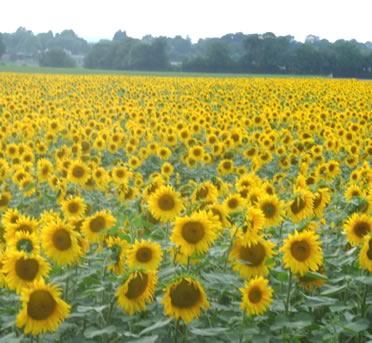
The Smiths decided that the business could only work if they pooled their skills, so, while Richard expanded his sunflowers to ten acres and planted another ten of white millet, Lesley set up a website and began marketing their new venture.
Today, Street End Farm’s breathtaking displays of sunflowers, a sight more commonly associated with balmy Tuscan landscapes, attract visitors from around the country. But it isn’t only day trippers who make an annual pilgrimage. “Having spent my life outdoors, I knew what type of seeds birds like and my planting reflects that,” Richard says. “Skylarks often wheel overhead when I’m out in the tractor, and the diverse crops attract new species, such as stonechats, every year.”
Having harvested his commercial crops of wheat, oats and oilseed in August, this month Richard turns his attention to the birdseed mixes. Once gathered, he spreads the seeds over a drying floor and passes warm air between them, before sending them through a series of vibrating sieves to remove stalks and other waste materials. Finally comes the blending and bagging.
“I had to work out how the components of my mixes would sit together – some naturally rise to the top, while others might clog the feeder. It took a great deal of trial and error to get the right balance,” Richard says. He launched five mixes and now produces 14, including a general one, four tailored to specific garden birds, and the Tidy Garden blend, for those who don’t want their lawns scattered with shells.
The process from field to packet takes three or four days but it’s heavily governed by the weather. “Last year was testing: it was so wet, we didn’t finish harvesting the sunflowers until November,” Richard adds. “But, if the weather is bad for crops, it usually means birds need a helping hand – which is good for business.”
At first, Richard and Lesley couldn’t simply rely on customers coming to them – the company is based online – so, by the end of 2005, they spent every weekend at farmers’ markets, spreading the quality birdseed word. It also proved a great opportunity to collect feedback. “One lady asked if I had anything for robins, which I didn’t, because I’d thought the cost of adding mealworms to a mix would be prohibitive,” Richard says. “I decided to try it out, though, and now our Deluxe Robin Crumble is one of our bestsellers.”
Slowly but steadily, five orders a month became one a day and by 2008 the business was starting to make money. “It was tough; we were living frugally on our savings,” Lesley says. “Richard used to ask me, ‘Is this going to work?’ I honestly didn’t know, but we’d given ourselves five years to try, and our only choice was to push on.”
Ploughing profits back into the business, Richard added canary seed and linseed to his crops, whose fragrant, lilac blooms in June begin a colourful crescendo that continues with the yellow-petalled sunflowers and tassled fronds of millet. Ensuring traceability of his product, he sources ingredients such as buckwheat and hemp, which are not financially viable for him to grow, from a producer in West Sussex.
The couple have also taken on three members of staff, and introduced a range of feeders and birdbaths. The birdseed business accounts for just 80 acres of the entire farm, but it has become its biggest income, and Richard is devoting more acreage to it every year. Running the company has introduced the family to another side of farm life.
“We weren’t avid birdwatchers before,” Lesley says, “but now we have let some areas grow wild and put up nesting boxes to help increase their numbers.” For Eleanor, growing up in such special surroundings is nothing out of the ordinary. “I have no idea if she’ll want to be a farmer,” Richard says. “All I know is that if we hadn’t started the birdseed business, she wouldn’t have had the choice.”
 Bird Feeders
Bird Feeders  Seed Feeders
Seed Feeders Peanut Feeders
Peanut Feeders Peanut Butter Feeders
Peanut Butter Feeders Suet & Fat Feeders
Suet & Fat Feeders Window Feeders
Window Feeders Hanging Feeders
Hanging Feeders Feeding Stations
Feeding Stations Ground Feeders
Ground Feeders Easy Clean Feeders
Easy Clean Feeders Bird Tables
Bird Tables Seed Trays
Seed Trays Bird Baths & Drinkers
Bird Baths & Drinkers Feeder Accessories
Feeder Accessories Feeder Hygiene
Feeder Hygiene Squirrel Proof Bird Feeders
Squirrel Proof Bird Feeders For the Kids
For the Kids Niger Seed Feeders
Niger Seed Feeders Mealworm Feeders
Mealworm Feeders Bird Food Storage
Bird Food Storage Fat Ball Feeders
Fat Ball Feeders Tube Feeders
Tube Feeders













